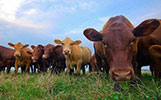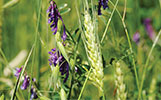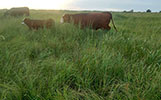| A Review of Sustainability Enhancements in the Beef Value Chain: State–of–the–Art and Recommendations of Future Improvements (PDF)
Global Roundtable for Sustainable Beef | March 22, 2017
To better address consumer concerns, the beef sector is working on strategies to enhance the sustainability of all aspects of the beef supply chain. Among these strategies are (1) the development of science–based frameworks and indicators capable of measuring progress at all stages of beef production; (2) the engagement of different stakeholders along the beef supply chain at regional and global levels; and (3) the improvement of communication among stakeholders and transparency towards consumers.
Progress on these three fronts was presented during the 2nd Global Conference on Sustainable Beef, hosted by the Global and Canadian Roundtables for Sustainable Beef. During the event, there was a clear understanding that the beef industry is substantially advancing efforts to continuously improve its sustainability, both at regional and global levels, by developing assessment frameworks and indicators to measure progress.
However, it is also clear that the beef sector has a need to more clearly define the concept of beef sustainability, strengthen cooperation and exchange of information among national roundtables for sustainable beef, as well as improve the flow of information along the supply chain. An improved transparency in the beef sector will help consumers make more informed decisions about food products.
2017 Rangeland Summit
University of California Cooperative Extension | January 18, 2017
The 2017 Rangeland Summit was held again at the Stockton Ag Center. For anyone who missed the Summit, or for those that would like to see any of the presentations again, the slides can all be found here. For more information about the California Rangeland Conservation Coalition, please see their website here.
Blue Apron Acquires Bill Niman's Sustainable Meat Company 
Jan Lee, Triple Pundit | March 24, 2017
For many who are familiar with Bill Niman's efforts to reform how the country's beef, pork and poultry industries treat their most prized stock, Thursday may have seemed like a sad day.
But to hear Niman tell it, the sale of BN Ranch to the blue–ribbon pre–packaged meal service Blue Apron culminates a journey to his life's dream. As a member of Blue Apron's staff, he'll be able to continue influencing the way America raises the animals it counts on for food.
Dawn Meats Sets Out Sustainability Targets 
Aiden Fortune, Meat Trades Journal | March 27, 2017
SBeef and lamb processor Dawn Meats has set the ambitious target of becoming "Europe's most sustainable meat company". In its first Corporate Social Responsibility (CSR) report, it pledged to cut water and energy usage by 40% and CO2 emission intensity by 50%by 2025.
NT Cattlemen's Association President Calls on Beef Industry to Protect And Enhance Competitive Advantage
Carl Curtain, ABC Online | March 30, 2017
The president of the Northern Territory Cattlemen's Association (NTCA) says the top six inches of soil remains the cornerstone to prosperity for the northern beef industry.
Around 500 delegates from around Australia and overseas are in Darwin this week for the NTCA's annual conference.
A number of guest speakers at the event include the Minister for Northern Australia Matt Cananvan, former minister for trade and investment Andrew Robb, and former NT chief ministers Adam Giles and Paul Henderson.
Soil Health Is More Than Just Cover Crops 
Jeff Goodwin, Hay and Forage Growers | February 15, 2017
For more than a decade, a movement has been taking the agriculture industry by storm. That movement is called soil health. This movement was not born in a laboratory nor by legislation. It was born by farmers and ranchers who wanted to do things differently.
Sixty years ago, the agriculture industry was operating on cheap feed, cheap fertilizer, and cheap fuel. Our industry and our science during that time period focused on the chemical and physical characteristics of soils with little to no consideration of soil biological interactions. During this period, the prices of feed, fertilizer, and fuel eventually elevated to the point at which they became unsustainable for many operations. Some farmers had to make a choice, continue doing what was always done or find new ways to farm.
Reaping the Benefits of Perennial Grazing 
Rhonda McCurry, No–Till Farmer | March 8, 2017
Cows graze in native pastures at Thompson Farms, managed by Osage City, Kan., no–tillers Keith and Ben Thompson. The Thompson cow herd is comprised of crossbreeds that are bred to calve in April and May. During calving season Ben runs them on cover crops, and likes rye the best for cows that are due in late spring.
The Thompson family can speak volumes about no–till practices and soil health. But what they focus on now is affectionately referred to as "regenerative farming" through a rotation of perennial grazing.
Sustainably Managed Livestock Are Essential to Livelihoods and Healthy Agro–Ecosystems (YouTube Video)
Livestock Global Alliance | May 24, 2016
Farm animals are critical for human development. A small daily amount of meat, milk and eggs can contribute greatly to a healthy diet. Livestock contribute up to 60% of agricultural GDP in developing nations. They provide livelihoods for some 1.3 billion people.Livestock can help to maintain healthy ecosystems and regenerate degraded land. They provide natural fertiliser and renewable energy to help manage land sustainably. Sustainable livestock, sustainable lives. Watch 1:21 Video HERE.
Government of Pará Defends Environmental Regularity of Meat Industry
Agencia Para | March 30, 2017
Government of Pará, parliamentarians from Pará state, entities and companies of the meat industry in the state, met this Wednesday in Brasília, with the Minister of the Environment, Sarney Filho, president and directors of the Brazilian Institute of Environment and Resources Renewable Natural Resources (Ibama), to deal with the unfolding of Operation Cold Meat. The hearing was requested by Senator Flexa Ribeiro (PSDB / PA) and also had several members of the parliamentary group of Pará in the National Congress. | |
